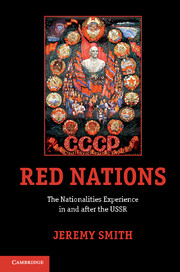Book contents
- Frontmatter
- Dedication
- Contents
- Tables
- Preface
- 1 Introduction: the prison-house of nations
- 2 Dispersal and reunion: revolution and civil war in the borderlands
- 3 Bolshevik nationality policies and the formation of the USSR: the Bolsheviks dispute national policy
- 4 Nation-building the Soviet way
- 5 Surviving the Stalinist onslaught, 1928–1941
- 6 The Great Patriotic War and after
- 7 Deportations
- 8 Territorial expansion and the Baltic exception
- 9 Destalinisation and the revival of the republics
- 10 Stability and national development: the Brezhnev years, 1964–1982
- 11 From reform to dissolution, 1982–1991
- 12 Nation-making in the post-Soviet states
- 13 The orphans of the Soviet Union: Chechnya, Nagorno Karabakh, Abkhazia, South Ossetia and Transdniester
- Conclusion
- Bibliography
- Index
- References
11 - From reform to dissolution, 1982–1991
Published online by Cambridge University Press: 05 June 2014
- Frontmatter
- Dedication
- Contents
- Tables
- Preface
- 1 Introduction: the prison-house of nations
- 2 Dispersal and reunion: revolution and civil war in the borderlands
- 3 Bolshevik nationality policies and the formation of the USSR: the Bolsheviks dispute national policy
- 4 Nation-building the Soviet way
- 5 Surviving the Stalinist onslaught, 1928–1941
- 6 The Great Patriotic War and after
- 7 Deportations
- 8 Territorial expansion and the Baltic exception
- 9 Destalinisation and the revival of the republics
- 10 Stability and national development: the Brezhnev years, 1964–1982
- 11 From reform to dissolution, 1982–1991
- 12 Nation-making in the post-Soviet states
- 13 The orphans of the Soviet Union: Chechnya, Nagorno Karabakh, Abkhazia, South Ossetia and Transdniester
- Conclusion
- Bibliography
- Index
- References
Summary
Speaking on the sixtieth anniversary of the creation of the USSR in 1982, Yuri Andropov affirmed the Soviet state’s commitment to the economic and social equalisation of the different nationalities of the USSR. He had nothing to say about any putative ‘drawing together’ or ‘merger’ of nations. Effectively, he was confirming in rhetoric the situation that already existed in practice, and committed the regime to completing the process of equalisation through quota systems in higher education and other forms of affirmative action. Such policies were typical of Andropov’s cautious approach to reform, a need for which he clearly recognised, but nationality relations were not at the top of his agenda. His successor as general secretary, Konstantin Chernenko, was an avowed supporter of the increasing use of the Russian language in national schools, but his efforts to make changes in this direction met with the same fate as those of his predecessors. Little affected the nationalities experience, then, during the short reigns of these two heirs of Brezhnev. But the situation was to develop in an entirely new direction not long after Chernenko’s death, and the appointment as general secretary of the CC of the CPSU of a young leader who, until recently, had been working in the Russian provinces.
- Type
- Chapter
- Information
- Red NationsThe Nationalities Experience in and after the USSR, pp. 256 - 281Publisher: Cambridge University PressPrint publication year: 2013



